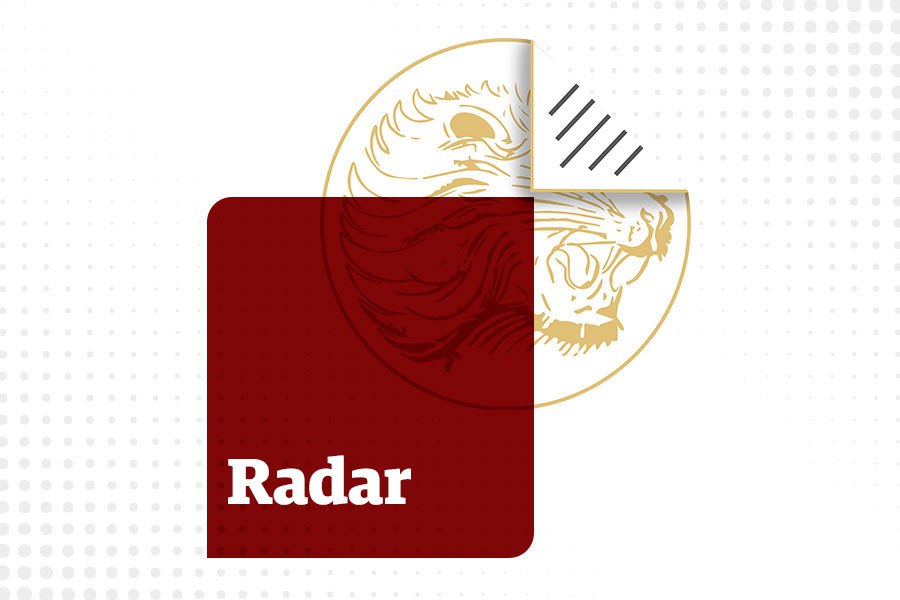
Radar |
Unhabitual, perhaps too many, Samuel Gebreyohannes, 38, used to occasionally enjoy a couple of beers at breakfast. However, he recently switched to local brews following a 20 Br increase in beer prices at his usual spot. He humorously compared his changes to the escalated gas prices, quipping, “Do people stop driving when gas prices escalate?"
For him, motorists find alternatives.
Running a neighbourhood corner liquor store, Godoliyas, he reflected on the changing business environment while looking out late an afternoon a fortnight ago at the streets of Summit Road in northeastern Addis Abeba. Lately, sales have been dwindling by as much as half, and the price of a crate of beer has been running high. His store has seen better days. Nostalgic of the past, his worries used to focus on profit margins rather than sustaining the business.
“It has changed now,” he said. “There are days when I don’t even make sales.”
Unbeknownst to him, breweries have increased their factory gate prices by 200 Br for a crate in the last month. Anticipating the collection of 24.4 billion Br from excise tax this fiscal year, with over 37pc expected from the brewery industry alone, the Ministry of Finance adjusted the excise tax only a year after the previous changes. Beverages with up to five percent alcoholic content are now subject to a 40pc excise tax or 28 Br a litre, resulting in at least 9.24 Br increase for each beer bottle.
Excise tax is commonly levied on luxury items, products deemed harmful to public health, and non-mandatory consumer items. Governments often use it as a policy tool to shield domestic industries from external competition, imposing this form of tax on imported items. If imposed on domestic producers, their products are taxed at the factory gate. The recent excise tax adjustment is expected to have a three billion Birr impact on the beer industry, where four breweries dominate the market.
Executives of these companies, already burdened by restricted promotions of their products in the public sphere and heavy taxation, are fretting about another impending tax item: the excise stamp.
The Finance Ministry issued the excise stamp directive a year ago, following a four-year proclamation. The directive's authors claim to create "a robust and transparent excise tax management system" to prevent counterfeiting, track goods, verify stamps, and follow international standards.
The latest excise tax stamp management system has stirred considerable attention. To some, it suggests another shift in the federal government’s fiscal framework. To others, it represents a potential opportunity for the government to mobilise revenues, arguing that it effectively helps control illegitimate markets. Tax officials could easily discern which goods comply with tax regulations by placing a stamp on products. This, the authorities hope, would increase tax revenue - a notion that has piqued the interest of many fiscal conservatives.
In a recent budget speech before Parliament, Ahmed Shide, minister of Finance, stressed the excise tax stamp system is crucial for enforcing the excise tax law by stunting tax evasion and fraud while collecting more revenues. His supporters resonate with him, believing that it provides a more transparent and traceable method of taxation. They hope the sharpened level of transparency could reduce the chances of tax evasion, further increasing the state's tax income.
An anonymous source within the taxation system heralded the proposal as a "game-changer," a sentiment many within the government echoed.
However, not everyone is convinced by these assumed benefits.
Critics argue that introducing an excise tax stamp system could increase costs for businesses, particularly small ones. Additional expenses could arise from buying the stamps and adapting their production lines to accommodate the new system. This, they assert, could stifle expansion and growth.
Two years ago, the Ministry requested expression of interest for prospective supplies of technology solutions for the excise stamp and excise management system, attracting 18 bidders. The bid review process has narrowed them to eight, disclosed Abraham Rega, a legal expert at the Ministry.
“It’s still ongoing,” he said.
The bid involves supplying an excise stamp system that manages from the creation, production, and storage to the distribution and authentication of excise stamps. It includes a web-based ordering system with electronic communication and reporting modules, verification tools for stamp authentication, and accounting for the entire lifecycle of excise stamps. An optional track-and-trace system is also part of the package.
“We’ll ensure the right solution will selected,” Abraham told Fortune.
Critics fear that implementing such a system could inadvertently create a new parallel market — this time for counterfeit tax stamps. An industry insider pointed to examples in other countries where this had occurred, adding gravely, "The road to hell is often paved with good intentions."
The brewers are not pleased with the new demand in their industry, supporting their scepticism based on a study they commissioned from an independent consulting firm.
Conducted by HST Consult Plc, a private audit firm run by Solomon Gizaw and Tekeste Gebru, the study warns that the proposed system may cause more harm than good to the industry. It argues that the risk of counterfeit products in the beer industry is almost nonexistent, making the discernible benefits of the excise tax stamp system insignificant compared to the substantial costs. The firm finds that the brewers may face costs of 372.3 million dollars, including an acquisition cost of 21.8 million dollars and operational costs potentially reaching 223 million dollars.
It also argues that the brewery industry's excise tax compliance is already very high. It had an excise tax return of 4.99 billion Br in 2019/20, which grew by 59pc and 52pc in the consecutive years.
The Ethiopian Brewers’ Association, an industry lobby group, hopes to reach a deal favourable to its members: Heineken Ethiopia, BGI Ethiopia, Dashen Breweries, and Habesha Breweries.
These companies produce approximately 15.15 million hectoliters of beer annually. The industry traces its roots back to 1922 when Emperor Hailesellasie's endowment company launched St. George Beer. Since then, the industry has grown substantially, with five leading breweries operating 13 plants nationwide. The four major breweries together produce at least 20 different brands, with Heineken having the highest number of brands at nine, followed by BGI Ethiopia's six.
Despite the industry's growth, the brewers see the proposal to implement an excise tax stamp system as unwarranted and costly.
Many in the industry find the recent excise tax amendment unexpected and sudden.
“We were never consulted on this directive," said Herve Milhade, CEO of BGI Ethiopia, who is currently assessing its impact on the company's sales.
He believes it is unfortunate that the cost should be transferred to consumers.
“We need to maintain our margin to continue financing our investment,” he told Fortune.
BGI Ethiopia, known for its leading brand, St. George, and premium brand, Castel, is in an expansion strategy slated for 2028. Herve foresees that the implications will include a margin decrease, more undersized financial capacity to invest, potentially lowering volume, and impacting tax collections. He expects budget beers to be more affected as price-sensitive consumers may reduce their consumption or switch to other alternatives.
“With the steep price increase, we hope our consumers will not lower their consumption,” he told Fortune. “It puts the larger industry at risk.”
The consultants direct the Ministry's officials to reckon the vulnerability of excisable products to illicit trade, counterfeiting, and tax evasion, particularly in the tobacco industry. They urge considering the brewery industry's volitional tax compliance level to avoid imposing a blanket system and proposed producing the excise tax stamp management system locally, partnering with local technology companies and excise taxpayers like breweries.
Ironically, officials and advisors at the Ministry claim they are unaware of the study, but a senior advisor to the Finance Minister expressed confidence in their research.
“We’ve done our own study,” he said. “It’s not like we woke up one day and decided to impose it.”
The directive's early weeks of enforcement have yet to show marked changes in demand. However, a decline is expected, impacting revenues and, consequently, the federal government's tax income from the industry. Herve believes the tax base should be broadened to avoid disproportionately impacting breweries with high taxes and duties.
HST's study shows the need for more comprehensive consultations with operators to ensure that such initiatives do not inadvertently harm the industries they seek to regulate. The directive alludes to inflation adjustments that could be made at least once a year based on the specific excise tax rates.
While tax experts acknowledge the burden of inflation on price tags, they believe an excise stamp is a tax instrument for regulating industries.
For Yohannes Woldegebriel, a veteran lawyer specialising in tax laws, the authorities' enforcing a proclamation ratified four years ago "seems reasonable.” He would rather see brewery executives argue for transparency during the bid process to install technologies and ease of doing business to increase their overall productivity.
Breweries argue that business decisions should be motivated by economic rather than tax considerations. They warn that a decline in the tax base will have a cascading effect on the supply chain, from farmers to distributors and consumers.
Heineken Ethiopia is one of the country's top 10 highest taxpayers, recognised as a platinum taxpayer. The company funnelled no less than nine billion Birr in tax in the last fiscal year.
Its Managing Director, Bart De Keninck, also president of the Ethiopian Brewers’ Association, observed that the focus seems to be on generating more from highly compliant businesses in the economy.
“There is zero illicit beer available in the market,” he said, arguing that the excise tax stamp is a track-and-trace system targeting illicit and counterfeit products.
Bart recalled that the beverage industry took three years to recover from the last major tax revision, in 2020, which tripled the excise tax rate.
“We’ve seen a major reduction in economy beer segment volume,” he said.
The stamp tax system's burden to the industry he leads includes additional investment costs for machinery installation, system integration, and constant running once operational, as well as delays in bottling lines and disruptions during internet interruptions.
“The system can only work with reliable internet access,” said Bart.
He expressed concern that these burdens would impact productivity and government revenue generation.
“We’re worried it will make our products unaffordable for consumers," he told Fortune. "The sector, in general, will shrink.”
PUBLISHED ON
Jul 28,2024 [ VOL
25 , NO
1265]

Radar |

Radar | Aug 04,2024

Fortune News | Mar 09,2024

Obituary | Sep 29,2024

Delicate Number | Mar 16,2024

Radar | May 27,2023

Sunday with Eden | Nov 09,2019

Radar | Oct 06,2024

Commentaries | Sep 03,2022

Viewpoints | Aug 03,2019

Dec 22 , 2024 . By TIZITA SHEWAFERAW
Charged with transforming colossal state-owned enterprises into modern and competitiv...

Aug 18 , 2024 . By AKSAH ITALO
Although predictable Yonas Zerihun's job in the ride-hailing service is not immune to...

Jul 28 , 2024 . By TIZITA SHEWAFERAW
Unhabitual, perhaps too many, Samuel Gebreyohannes, 38, used to occasionally enjoy a couple of beers at breakfast. However, he recently swit...

Jul 13 , 2024 . By AKSAH ITALO
Investors who rely on tractors, trucks, and field vehicles for commuting, transporting commodities, and f...

Jul 12 , 2025
Political leaders and their policy advisors often promise great leaps forward, yet th...

Jul 5 , 2025
Six years ago, Ethiopia was the darling of international liberal commentators. A year...

Jun 28 , 2025
Meseret Damtie, the assertive auditor general, has never been shy about naming names...

Jun 21 , 2025
A well-worn adage says, “Budget is not destiny, but it is direction.” Examining t...